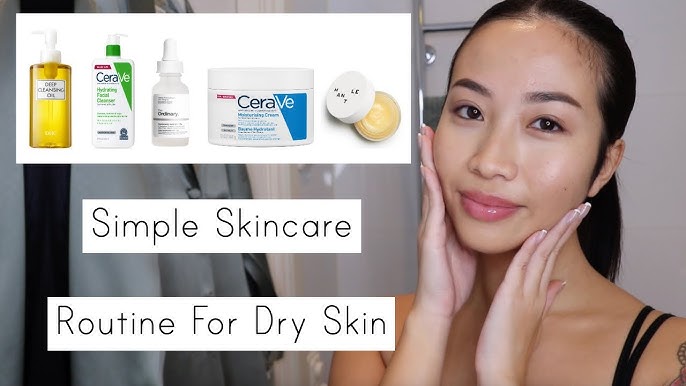Amazing Skin Care Routine for Dry Skin
Dry skin does not have moisture, causing dry, rough, or flakey skin. It’s common to experience dry skin during cooler months, but you can also have a dry skin type that lasts throughout the year.
Dry skin can feel uncomfortable and itchy, but tailoring your skincare routine to add hydration back to your skin can help rebalance your skin’s moisture.
A basic dry skincare routine includes a cleanser, moisturizer, and sunscreen with moisturizing ingredients like ceramides, hyaluronic acid, and glycerin.
However, depending on your skin’s needs, you can add more products to your daytime and nighttime skincare routines. Here’s what dermatologists recommend to build the best skincare routine for dry skin.
What is Dry Skin?

Your epidermis, or the outer layer of your skin, has a delicate barrier that holds in water to hydrate and protect your skin from the elements. Dry skin, also known as xerosis or xeroderma, happens when your skin barrier loses water too quickly.
As a result, individuals with dry skin have skin that can feel:
- Itchy
- Cracked
- Rough
- Tight
- Flaky
- Scaly
Morning Skincare Routine for Dry Skin
A nice morning skincare routine helps prepare dry skin for the elements by adding moisture to your lacking skin barrier.
Here is how to help one’s dry skin stay hydrated and flake-free during the day.
Step 1: Cleanser
Cleansing one skin should always be one’s first step in the morning to remove dirt and create a clean slate. However, dry skin types should also find cleansers that add moisture to their skin and do not strip away much-needed face oils.
“Gentle cleansers, oil cleansers, and moisturizing cleansers with gentle and hydrating ingredients—such as glycerin, ceramides, and hyaluronic acid—are best for dry skin,” said Engelman. Oil-based cleansers are especially ideal for individuals with extremely dry skin to help seal in moisture.
Step 2: Toner
Toners are an optional skincare step that mainly removes leftover oil and dirt. For this reason, many toners irritate dry skin and are better for oily, acne-prone skin.
However, there are toners designed to hydrate dry skin. Engelman suggested choosing alcohol-free toners that contain hydrating and soothing ingredients like hyaluronic acid, vitamin E, and aloe. These types of toners can support the most sensitive skin.
Step 3: Serums
Serums are water-based skin treatments with a high concentration of active ingredients. If you have dry skin, look for serums with actives to help hydrate and protect your skin from dry environments.
Hyaluronic acid serums are great for dry skin and help draw water to the skin barrier, Lindsey Zubritsky, MD, FAAD, a board-certified dermatologist at Premier Dermatology and Skin Cancer Center, told Health.5 Zubritsky suggests applying hyaluronic acid serums to wet skin to pull more water into your skin.
Engelman also recommends serums with hydrating B Vitamins like niacinamide and panthenol.78 Serums with ceramides and vitamin E can also help replenish hydration levels and enhance the skin barrier.96
People with dry skin can also use popular Vitamin C serums to help brighten skin, fade hyperpigmentation, and reduce UV damage. “If you are using a vitamin C serum, try a tetrahexyldecyl ascorbate product over an L-ascorbic product as this is more hydrating and less irritating to the skin,” Mary Alice Mina, MD, a board-certified dermatologist and dermatologic surgeon at Baucom & Mina Derm Surgery and host of The Skin Real podcast, told Health.
Step 4: Eye Cream
Eye creams are also another optional addition to your daytime skincare routine. For dry skin, look for eye creams with hydrating peptides to add moisture to the delicate, often dry under-eye area.11 Daytime eye creams with antioxidants like Vitamin C and SPF can also help protect your delicate under eyes from sun damage.
Step 5: Moisturizer
Applying a rich moisturizer is essential to a dry skincare routine. Moisturizers repair a dry skin barrier by increasing your skin’s water content and sealing in moisture.
Mina recommends sticking with thick cream or oil-based moisturizers, especially with ingredients like ceramides, niacinamide, and hyaluronic acid to lock in moisture and rebuild the skin barrier. Zubritsky also recommends moisturizers with softening and moisturizing ingredients like squalane, shea butter, and glycerin.9
Step 6: Sunscreen
Dry skin needs protected from UV rays, too. Your morning skincare routine should always end with applying sunscreen with a sun protection factor (SPF) of 30 or higher.
Making sunscreen a daily priority helps reduce your risk of wrinkles, sun spots, and skin cancer. You should apply a nickel-sized amount of sunscreen on your face, neck, chest, and ears every 2 hours.
Dry skin types can use mineral or chemical sunscreen. Zubritsky recommended moisturizing sunscreens with ceramides to continue combatting dryness. “I like to recommend a mineral-based sunscreen, as ingredients in chemical-based sunscreens can sometimes sting and burn.” Araya “Jay” Zaesim, MD, FAAD, a board-certified dermatologist at U.S. Dermatology Partners, told Health.
Best Ingredients for Dry Skin

The best skincare for dry skin includes soothing ingredients, humectants, and emollients. Humectants are ingredients that bind to water and help pull water into your skin to moisturize. Emollients are moisturizers that create a barrier to help retain moisture and protect dry skin.
When choosing products for your dry skin, remember to look for these dermatologist-approved hydrating ingredients:
Niacinamide: This type of vitamin B3 can help soothe and hydrate dry, flakey skin by restoring moisture to the skin barrier. It also helps reduce environmental and UV damage, brightens skin, softens wrinkles, and shrinks pores.
Vitamin B5 (Panthenol): Panthenol is a form of vitamin B5 that is both a humectant and emollient, so it helps retain water and seal in moisturizer. It also helps soothe skin and protect against UV damage and pollution.
Glycerin: As a humectant, glycerin pulls moisture into the outer skin layer to increase hydration.
Hyaluronic acid: Like glycerin, hyaluronic acid is a humectant that attracts water to the skin barrier for ultimate hydration.
Ceramides: These fatty molecules are the building blocks of your skin that help prevent water loss and environmental damage. Adding skincare with ceramides repairs any holes in these building blocks to rebuild the skin barrier.
Bottom Line
Dry skin does not have moisture, leading to rough, flaky, and tight skin. Tailoring your skincare routine to replenish water can help rebalance your dry skin barrier.
A common skincare routine for dry skin includes a cleanser, moisturizer, and sunscreen with hydrating ingredients like ceramides, hyaluronic acid, peptides, and glycerin. You can customize your routine with hydrating serums, eye creams, face oils, and night creams.







